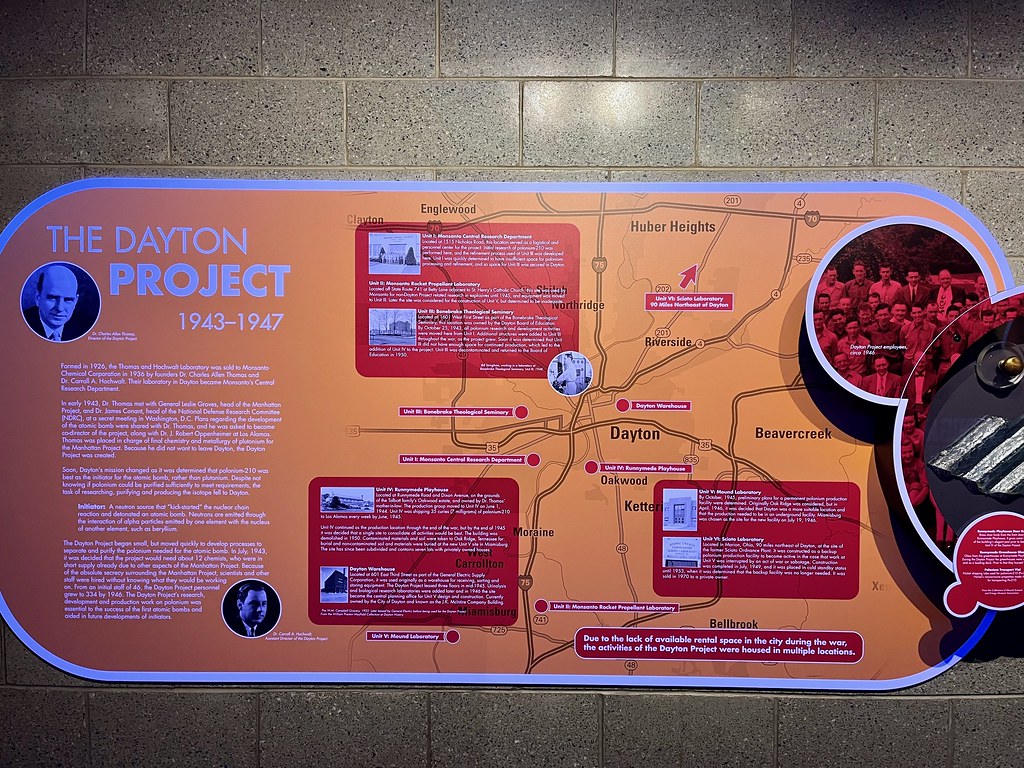Sure, I visited the various Wright Brothers museums, historical sites, and memorials but they weren’t the totality of Dayton’s remarkable legacy. It wasn’t even the reason why we visited. I mentioned the younger kid’s interest in all things aeronautical earlier and it traced back to that. Honestly the only place we had to see was the National Museum of the U.S. Air Force. Everything else was a bonus, and a lot of bonus opportunities presented themselves through a variety of museums.
National Museum of the U.S. Air Force

But let’s go ahead and start with the main attraction, the National Museum of the United States Air Force on the edge of Wright-Patterson Air Force Base (map). I’d never been there before although I’d heard good things about it from the rest of the family. They all stopped here on a drive to St. Louis in 2017 (I flew and joined them later). However, they didn’t get to see the whole thing and it became a great reason to try again.

This place is huge. I always thought the Smithsonian National Air and Space Museum’s Udvar-Hazy Center was overwhelming. However it didn’t even come close. The Air Force Museum probably doubled that size with four massive hangar-like galleries stuffed with nearly every airplane ever used by the United States Air Force. Plus a lot more.
We reserved an entire day to work our way through it all, and we needed every bit of that time. I was mentally exhausted with complete aerospace overload by the time we got to several historical versions of the Presidential “Air Force One” at the back of the fourth gallery. This is definitely a see-it-again museum because it’s impossible to absorb everything in a single go.
Carillon Historical Park

Never having stayed in Dayton before, I’d never heard of Carillon Historical Park either (map). This is the flagship property of Montgomery County’s historical society. It includes both an indoor and an outdoor component on an expansive 65-acre campus.
The indoor portion looked much like a classic museum with galleries focused on different aspects of Dayton’s history, emphasizing industries that shaped the city. Outdoors, numerous original buildings relocated to the site lined walking paths like they were part of a town. These included pioneer homesteads, a church, a school, and various shops. Many of the buildings had people on site that offered further information or demonstrations, including crafts such as printing and brewing.
America’s Packard Museum

Apparently Ohio is large enough to accommodate two Packard museums, the National Packard Museum in Warren and America’s Packard Museum in Dayton (map). That’s two more Packard museums than I would have expected. We were in Dayton so naturally we visited the one there.
Packard was a luxury automobile company that operated between 1899 and 1958. Early Packard models cost something like $2,500 when the average vehicle cost maybe a quarter of that. And that was back when the average person couldn’t even afford the average vehicle. World leaders and Hollywood celebrities rode in Packards. These cars were beautifully crafted and the museum housed numerous Art Deco masterpieces meticulously restored to showroom quality.
We almost didn’t go here. I didn’t think it would interest the family so I didn’t even put it on our list. My kid saw it in a brochure and suggested we go when we had a little slack one afternoon. Good call kid!
Mound Cold War Discovery Center

The same folks who operated Carillon Historical Park also managed a few smaller facilities around the area including the Mound Cold War Discovery Center. It was a short drive south of Dayton in Miamisburg (map).
The Dayton Project had been part of the overall Manhattan Project during World War II. Specifically, the Dayton Project focused on developing the atomic bomb trigger. After the war, the Atomic Energy Commission formalized administration and created permanent locations for their clandestine efforts. As part of that, the successor to the Dayton Project coalesced in Miamisburg and became the Mound Laboratory. Work continued under tight security there until 2003. Today the Mound Cold War Discovery Center occupies a corner of that former facility and includes a number of displays focusing on the laboratory and the larger atomic weaponry story.
But why did they call it the Mound Laboratory?

Well, because a large Native American mound sits directly across the road. This conical burial mound rises about 65 feet (20 metres) and dates to about two thousand years ago, built by the Adena culture. It is also the largest mound of its type in the eastern part of the United States. This wasn’t the first time I’ve run across the remnants of the Adena culture. I’d seen their handiwork at the Serpent Mound Historical Site and the Grave Creek Mound on earlier trips to Ohio and West Virginia. This is the only one that comes with its own Cold War legacy though.
The Mound Cold War Discovery Center probably didn’t justify a trip all on its own. However, adding the Miamisburg Mound to the itinerary made it worthwhile.
Articles in the Dayton, Ohio Series
See Also: The Complete Photo Album on Flickr

Leave a Reply